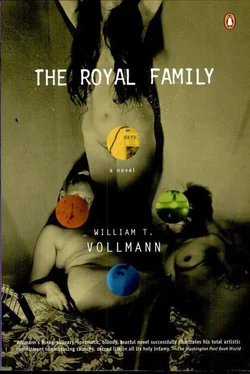The next day they found themselves driving into the stem of a gigantic cumulus mushroom whose restful purple underbelly loomed closer and closer, blue sky vanishing on either side. Ahead fell streams of violet rain. His wife licked her lips and devoured the first drop that struck the windshield, the second; now the car was shaken by rain; the hood danced with it. Two smart eyelashes swept back and forth across the car’s rectangular eye. Raindrops boiled on the pavement ahead and on the hood. Rain washed squashed bugs away, and they came out clean and new.
Each day the knot in his stomach tightened. They hadn’t been speaking for the last hours, after she’d screamed at him you asshole and then ordered him to read out the directions, and he said: Not until after you apologize and she said: Not until you apologize for being an asshole.
The cornfields and cumuli of Iowa showed him purity unequaled (he didn’t know what his wife thought), and he said to himself: There ought to be a saying: as pure as a cloud in Iowa. His stomach ached. They passed a waterslide amusement park in the middle of the cornfields—
That night they were to stop at the house of one of her colleagues, who’d just moved to Omaha, and he dreaded it because if there was not to be a scene before the colleagues there must be false cheeriness; fortunately he barely knew them; the hypocrisy would not be as grave. He dreaded it eating the clouds that boiled up in towers and pointing fingers; he dreaded it rolling across the wide brown rivers of low fat trees. There were so many things she was required to apologize for now that he supposed he’d better buy a little black book to keep track of them all in. But then she’d get a black book, too, and she’d write down lies about him. Then he’d have to find her black book and erase the lies. They’d end up hiding their black books from each other. Someday soon he must start taking revenge by the breasts. A goose and three goslings tried to cross the freeway. His wife swerved to avoid them. They danced back into the other lane, and then a car came round the bend and squashed them. At twilight, approaching Council Bluffs, the road began to sing, a steady breathless aaaaah whose cadence wavered with the angle of the road; the shoulder glowed white in the sun; trees and prairie grass vanished in the sun’s hurtful orange glare, which leaped from tree to tree, always the same spot of ferocious blindness. When they pulled up before the just completed house, which lurked in a gated labyrinth of just completed houses already Kentucky bluegrassed into permanence, when they rolled into the three-car garage, the colleague came out smiling and went over to the driver’s side where his wife was unstrapping herself from seatbelt coils. He got out before she did and went around to the driver’s side and said to the engineer: Well, Ernest, how are you? — Linda! cried the engineer, beaming as the driver’s door swung open. — What a lovely house! the octopus wife said. (He hadn’t heard her voice for eight hours.) — How are you, Ernest? he said again. — The engineer didn’t even look at him. He wondered if there was something wrong with his face. He wondered if his face was the same as it had been the night that his wife and the engineer had graduated together from the refrigerator institute and his wife had been screaming at him asshole and fucking asshole and bastard just before the graduation and then it was time to put on his suit and tie in her honor. He had considered not going, but this was an occasion that would never come back for her; he had no right to do that unless he was going to leave her and he couldn’t do that because she’d won him and spread her hands over him night after night, widening her fingers like muskets aimed from behind a wagon-train. He got dressed. She never told him anything about her work, so he didn’t even know who was graduating and who the other people were, and his feet hurt in the dress shoes because the reception was being held in a concrete warehouse filled with the latest smart refrigerators that talked back to you when you asked for a glass of milk, so finally he went into the buffet room where it was just him and the piano player; misery stabbed him and twisted, but his chest strained hard against the point of it, strained by habit so that no harm was done. Misery shot casts at him but could not hurt him because he knew that it was there; he hardened himself, expressionless. He sat down at at a table weighted with romantic candle flames, awaiting the hour for dinner, and when it came, when the others gathered there (no dodging them now), his wife sat down beside him. His callus-armored heart split open in a great cracked clang of pain, and the soul-blood spurted; so he rendered up to her the incarnadine prize. He would not change his face. They stared at him and talked to him as if he were an imbecile and finally ignored him. She was the class president. After dinner it was time for her speech, which he also dreaded like a shower of scorpions because last year’s class president had thanked his wife in his speech, but this wife of his would not thank him. Of course he hoped she would. As she drew closer and closer to that part of her speech, he began to believe that her colleagues were eye-raping him just as courtroom spectators will watch the accused when the foreman of the jury rises to give his verdict. Now she was at that part, and it gave him bliss beyond words to know that she wasn’t going to thank him; that way he could go on hating her. When her speech was over, and she hadn’t thanked him, the leaden-headed clawshaft of humiliation hammered him almost backward, impaled him to his seat. Looking at his plate, he saw that he hadn’t eaten any dinner. When the engineer’s wife said goodbye to everyone, she kissed everyone else’s cheek, but she only shook his hand and told him loudly that she was leaving, as if to a senile grandparent. It was to her magnificent new house (which had been lived in for less than a week) that he and his octopus wife had now driven. The house was so huge that all the couple’s possessions barely made a dent in it. Fierce sunlight zigzagged down the carpeted stairs; carpeted rooms of oceanic vastness bore nothing on their down but a child’s ball, were sunned by no lamps yet; genesis had not finished; there were so many rooms! The garage had arch-shaped windows. Moldings and central vacuum units and doors leading to great caves confused him. Outside there were other lawns and other new houses; nothing else but a smoldering humid sky. — How are you, Ernest? he said a third time, at the next lull. The engineer never looked at him. He began another conversation with the octopus-minded woman, who was raptly stroking the engineer’s new car. — Glad to hear it, Ernest, he said softly.
Inside, he and his octopus wife admired the house in separate but equal ways, praising, lying, rhapsodizing, propagandizing like performers skilled at song; talking never to each other. The engineer and his wife were so caught up in the narcissism of owning their new house that they didn’t notice, believing that their house truly was the best in the world because they lived in it; naturally the world (comprising in this case their first two house-guests) would so praise the house, holding it in such reverence that they wouldn’t talk to one another… The engineer took them to examine the back lawn. Our hero told the engineer to weather-seal the deck posts. The engineer could hear him now; he was talking about the engineer’s house. But there remained a fretful expression on the engineer’s face when he said anything to him; when he took two steps backward, leaving the engineer to babble with the two wives in those carpeted caverns, then that expression eased, and the engineer no longer tapped his foot…
Читать дальше












